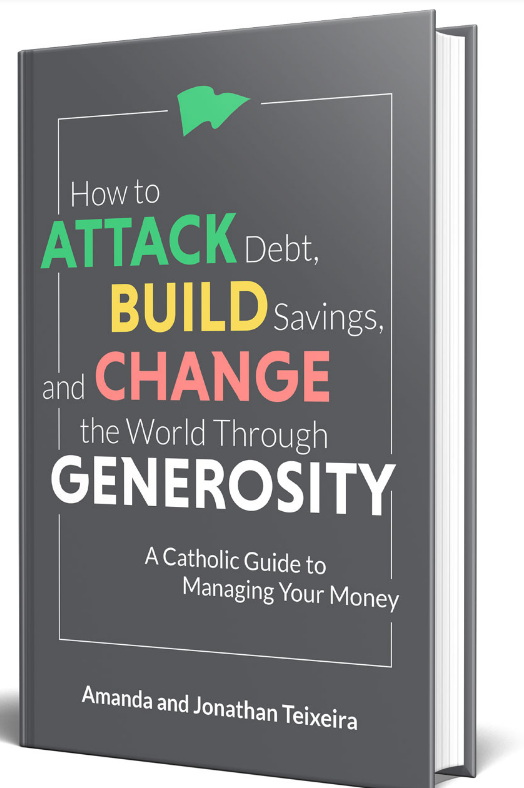How to Attack Debt, Build Savings, and Change the World through Generosity: A Catholic Guide to Managing Your Money
by Amanda and Jonathan Teixeira
The authors are the founders of WalletWin, an organization offering courses and support in learning to budget, pay off debt, and grow wealth.
This book was recommended in one of the Facebook discussions of the Mater Amabilis group when someone asked about personal finance. I've assigned You Need a Budget for my homeschool's personal finance study and was satisfied with the book. The recommendation was glowing, though, and since it seemed like it might appeal to other Mater Amabilis families, I decided I'd get a copy to see for myself.
I was pleased to learn the Teixerias actually use the YNAB system, which is my favorite way to budget and plan. They explain enough you don't need any prior knowledge of it to understand their book.
As I was reading, I found the financial advice solid, but not much different that what I have read in financial columns, from Dave Ramsey, or from You Need a Budget. One benefit of this book over You Need a Budget is the assumption you are planning a financial future with a spouse, rather than a "partner," which most Catholic homeschoolers would probably prefer.
The two chapters of Part V, though, brought to the fore-front what it means to live your Catholic faith as a person whose economic needs (and those of his or her family) are met.
A good, though fuzzy, rule of thumb is that you should give at a level that's noticeable, even a little uncomfortable. You should feel the difference that giving makes in your budget. (p. 257)
The Teixeiras challenge the reader to carefully and repeatedly consider what it means to give your excess away. They don't just encourage you to pray about your needs or to continuously examine your situation. They present what many would consider a counter-cultural example, even in the Christian world, of how to live generously.
You could use wealth to smooth out all the problems in your life, but the Teixeiras encourage you to meet your needs, and allow some suffering in order to be more generous.
Avoiding suffering can be another appetite that is never satisfied. There will always be some suffering, however small, to avoid, to stamp out, some annoyance you don't want to deal with, and will try to find a way not to. And this neverending quest for a perfect life here on earth will never end, except in misery and disappointment. (p. 277)
They suggest asking yourself, "Does addressing this suffering allow me to freely focus on God and my vocation/enter more fully into life, or might I be running away from life by trying to escape?" (p. 277)
Your money might be able to make some things happen, but the power is not yours. Even if you worked harder or smarter than others to earn your living--it doesn't mean you are more worthy or have more dignity than anyone else.
Remember, the money isn't even yours. It's God's money, and he's asking you to manage it for him. (p. 279)
I haven't used WalletWin; I've only read the book. If I heard a parish was considering offering Financial Peace University, though, I'd say, "Call WalletWin instead. Right now." No one asks me for financial advice, nor should they, but I will always recommend WalletWin over You Need a Budget or anything Dave Ramsey from now on.
One quibble, and one I have with essentially every Christian pay-down-your-debt-and-build-wealth book or program, is the idea that investments (e.g. for retirement) should be judged solely based on the rate of return. I would like to see more Christian and Catholic financial organizations address concerns about what companies are included in various mutual funds or investment portfolios and how those companies make their money, treat their employees, and act in the world. If you choose to avoid using products from a company because they allow child labor in their overseas practices, then you probably don't want to own stock in that company, but it's really difficult to find that message or to know what to do about it if you come to that decision on your own. If more companies like WalletWin spoke out about these kinds of issues, it could be the beginning of a movement.
I have updated our previous lesson plans to use this book instead of You Need a Budget. I am also going to encourage my older daughter, who already finished the old plans, to read the last couple of chapters.
I have received nothing in exchange for this post. I purchased the book. Links to Bookshop.org are affiliate links.




















